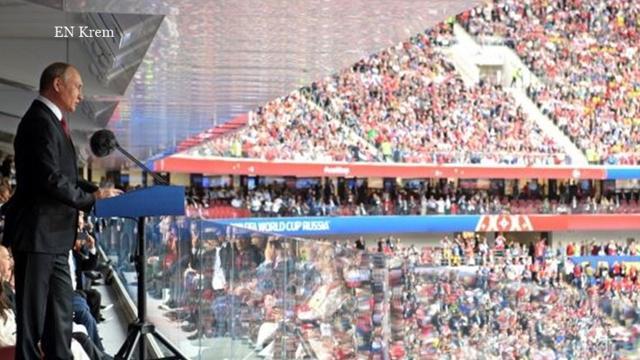In Iran, since the 1979 Islamic revolution, sport has been taken hostage by the Iranian regime authorities and used for their purposes.
The Football World Cup comes at a time when United States criticism of the regime has once again been ratcheted up by President Trump following his country’s decision to withdraw from the Iranian nuclear deal struck in 2015. No doubt the regime will be desperate for a good showing at the event.
Football, as the most popular expression of culture in Iran, is the most essential sport for the Iranian regime to control.
In past decades, we have seen the Revolutionary Guard moving into the management of football teams. They are on the boards of a number of different clubs.
Why the Iranian regime is taking sport hostage
The current Iranian regime feels the need to take every aspect of the sporting arena and the people involved in it hostage, under their control. A brief look at the life of one of Iranian sporting greats, Gholamreza Takhti, may help to explain why.
Gholamreza Takhti (1930-68) was a wrestler and is generally recognised as the greatest Iranian sports legend of the 20th century. This is not due solely to his athletic prowess, but in large part to the exemplary role model, he was for the nation, embodying the values of traditional Iranian chivalry.
The ideals of Iranian chivalry and sportsmanship are expressed by the concept of Pahlawan. A Pahlawan is not merely a champion, but also a moral exemplar who is just, fair, practices self-abnegation, is kind to the weak and stands up against oppression and injustice.
Takhti never indulged in the lewd post-bout sexual activity in the showers, which was tolerated in wrestling for many years, nor did he indulge in womanising.
However, he did become a symbol of Iranian nationalism, as the country grappled with finding a new international identity. He thus exemplified the ideals of a Pahlawan in more ways than one.
Women barred from stadiums
As the World Cup 2018 kicks off in Russia, Iranian women are looking forward to the chance to be part of the mixed crowd watching the games there without facing the fear or actuality of being punished or experiencing jail time as they would for doing the same thing in Iran.
Women have been barred from attending football matches, and some other sporting events such as wrestling, since the 1979 Islamic revolution, with officials saying they must be protected from the vulgar atmosphere.
Prohibition of women from entering stadiums to watch athletic games continues to be upheld in Iran as regime officials seek to prevent the participation of female spectators in whatever way they can.
Women are allowed to play football if they wear a headscarf, but they are banned from watching football matches between male teams. To circumvent the rule, Iranian women have often tried sneaking into football arenas by disguising themselves as men, even going as far as donning fake beards.
Those who are caught, are jailed.
For people in Western countries, the prohibition of women from entering stadiums no doubt seems very strange, if not incomprehensible, but in Iran, under the rule of the clerics, it is used as an instrument to crack down on the Iranian people.
Women barred from stadiums is not the only area in which sport and politics clash in Iran. The imposition of forced head covering for women from all over the world who wish to take part in sports hosted in Iran has led to some high profile cases of athletes, especially the women, deciding not to participate in these tournaments.
A recent case in point, Soumya Swaminathan, 29, a female chess grandmaster and member of the national team of India, announced on 13 June 2018, that she will not attend the Asian Chess Championship in Iran July - August.
She said that she does not want to be forced to wear a scarf or veil.
Swaminathan has stated that the law of hijab in Iran is a direct violation of human rights, including the right of free expression, the right of free thought, and the right of free belief and religion.
The Iranian people, while they will miss her presence at the tournament, applaud her moral stance and visible support for their cry for freedom.
Athletes as victims of poverty
In such a resource-rich country as Iran, it is a travesty that more than half of the population lives below the poverty line and tragic that sporting heroes are forced to steal to eat.
The Iranian regime’s criminal judiciary hanged Bahman Varmazyar, a sports coach, on 18 April 2018.
Accused of the armed robbery of a jewellery store, he was not allowed private legal representation. Following the efforts of Bahman’s family to save their son from execution, the mullahs’ regime falsely reported on Tuesday that his death sentence had been stopped, but he was executed on Wednesday early morning.
As another example of political interference in the sporting arena, an athlete, Mohammad Kahkehs, has been under arrest in Iran since August 2017. He was arrested for receiving an invitation from the Bodybuilding Federation of Israel and expressing interest in participating in the tournament.
The momentum for change
Belief in change in Iran was very difficult to hold onto until a year ago, but now it feels certain that change will be achieved by the Iranian people.
The ruling regime has not been able to eliminate dissent and opposition even through years of pressure, executions and society suppression.
On the ruins of all forms of dictatorship, Iran will be an oasis of freedom and democracy, a centre of security and brotherhood, serving the Iranian people’s interests and building a peaceful friendship with its neighbours and all countries of the world.
Of course, in such an atmosphere, discussion on the nature of sport in the country will be very different from today. We look forward to that discussion in a free Iran.




